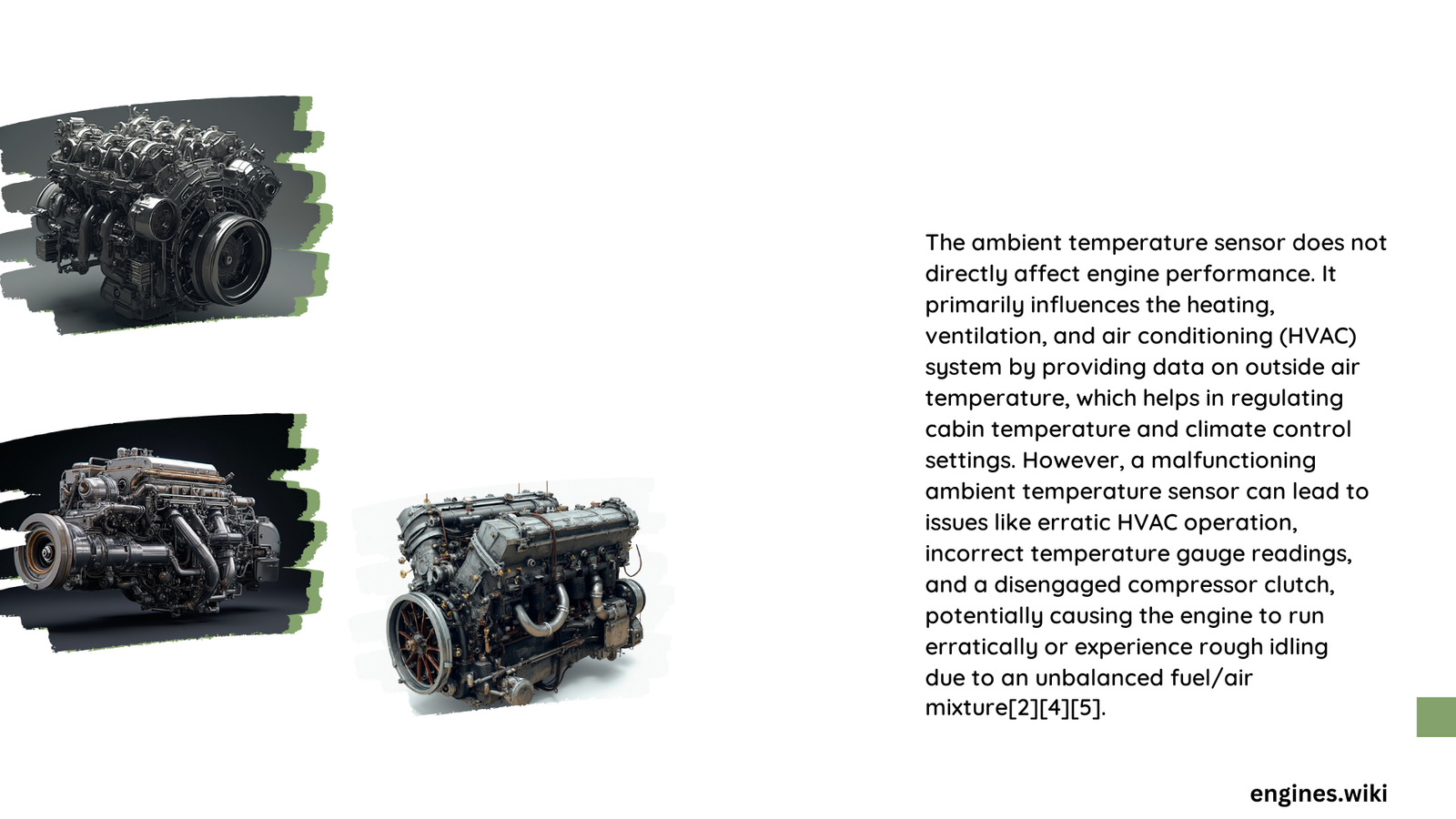The ambient temperature sensor in a vehicle primarily serves to provide data for the climate control system and display outside temperature. While it plays a crucial role in passenger comfort, its impact on engine performance is minimal. This sensor does not directly influence engine efficiency, fuel consumption, or operational parameters. Instead, it works in conjunction with other sensors to ensure optimal vehicle functionality.
What is the Primary Function of an Ambient Temperature Sensor?
The ambient temperature sensor, also known as the outside air temperature sensor, is designed to measure the temperature of the air surrounding the vehicle. Its main functions include:
- Providing data for the climate control system
- Displaying outside temperature on the instrument cluster or infotainment system
- Assisting in defrosting and defogging operations
Unlike other engine-related sensors, the ambient temperature sensor does not directly affect the engine’s performance or fuel efficiency.
How Does the Ambient Temperature Sensor Interact with Engine Systems?

While the ambient temperature sensor doesn’t directly affect engine performance, it does interact with various vehicle systems:
- Climate Control System: The sensor’s readings help adjust the HVAC system for optimal passenger comfort.
- Engine Control Unit (ECU): The ECU may use ambient temperature data as a reference point, but it relies more heavily on other sensors for engine management.
- Transmission Control: In some vehicles, the ambient temperature may influence transmission shift patterns in extreme conditions.
It’s important to note that the engine’s performance is more directly influenced by sensors such as the Intake Air Temperature (IAT) sensor and the Engine Coolant Temperature (ECT) sensor.
Does the Ambient Temperature Sensor Impact Fuel Efficiency?
The ambient temperature sensor does not have a significant direct impact on fuel efficiency. Fuel consumption is more closely related to:
- Engine load
- Driving conditions
- Vehicle speed
- Air-fuel mixture (controlled by other sensors)
While outside temperature can affect overall vehicle efficiency, this is not due to the ambient temperature sensor itself, but rather the physical properties of air density and its effects on engine operation.
What Happens if the Ambient Temperature Sensor Malfunctions?
A malfunctioning ambient temperature sensor can lead to several issues, although they are primarily related to comfort and convenience rather than engine performance:
- Incorrect temperature displays
- HVAC system malfunctions
- Inaccurate climate control
- Potential diagnostic trouble codes (DTCs)
Common DTCs related to ambient temperature sensor issues include:
| DTC Code | Description |
|---|---|
| P0071 | Ambient Air Temperature Sensor Range/Performance |
| P0072 | Ambient Air Temperature Sensor Circuit Low |
| P0073 | Ambient Air Temperature Sensor Circuit High |
While these codes may trigger the check engine light, they do not typically indicate a direct engine performance issue.
How Does the Ambient Temperature Sensor Compare to Other Engine Sensors?
To understand the role of the ambient temperature sensor in relation to engine performance, it’s helpful to compare it with other crucial engine sensors:
| Sensor | Primary Function | Direct Impact on Engine Performance |
|---|---|---|
| Ambient Temperature Sensor | Measure outside air temperature | Minimal |
| Intake Air Temperature (IAT) Sensor | Measure incoming air temperature | Significant |
| Engine Coolant Temperature (ECT) Sensor | Monitor engine coolant temperature | Critical |
| Mass Airflow (MAF) Sensor | Measure air mass entering the engine | Substantial |
| Oxygen (O2) Sensor | Monitor exhaust gas oxygen content | Essential |
As evident from this comparison, the ambient temperature sensor has the least direct impact on engine performance among these sensors.
Can the Ambient Temperature Sensor Affect Engine Diagnostics?
While the ambient temperature sensor can trigger specific diagnostic trouble codes, its impact on overall engine diagnostics is limited:
- Sensor-Specific Codes: DTCs like P0071, P0072, and P0073 are directly related to the ambient temperature sensor but don’t typically indicate engine performance issues.
- HVAC System Diagnostics: The sensor plays a more significant role in diagnosing climate control system problems.
- Indirect Effects: In rare cases, extremely inaccurate ambient temperature readings might lead to suboptimal climate control settings, potentially affecting engine load indirectly.
It’s important to note that engine diagnostics primarily rely on data from other sensors more directly related to engine operation.
How Does Extreme Weather Affect the Ambient Temperature Sensor and Engine Performance?
Extreme weather conditions can affect both the ambient temperature sensor and engine performance, but not necessarily in a correlated manner:
- Sensor Accuracy: Extreme heat or cold may affect the sensor’s accuracy, potentially leading to incorrect temperature displays.
- Engine Performance: Extreme temperatures can impact engine performance directly, regardless of the ambient temperature sensor’s readings:
- Cold weather: Can lead to thicker oil, reduced battery performance, and increased fuel consumption.
- Hot weather: May cause overheating, reduced air density, and increased strain on the cooling system.
While these effects are real, they are not mediated by the ambient temperature sensor itself.
What Maintenance is Required for the Ambient Temperature Sensor?
The ambient temperature sensor typically requires minimal maintenance:
- Regular Inspections: Visual checks for damage or corrosion during routine vehicle maintenance.
- Cleaning: Occasional cleaning to remove debris or buildup that might affect readings.
- Replacement: Only necessary if the sensor fails or provides consistently inaccurate readings.
Unlike engine-critical sensors, a malfunctioning ambient temperature sensor doesn’t usually require immediate attention unless it’s causing significant HVAC issues.
In conclusion, while the ambient temperature sensor is an important component for vehicle comfort and climate control, it does not significantly affect engine performance, fuel efficiency, or diagnostics. The engine’s operation is more directly influenced by other specialized sensors designed to monitor and control various aspects of engine function.
